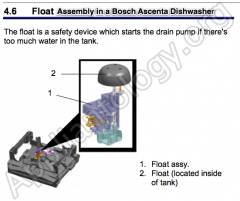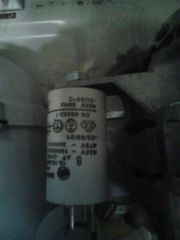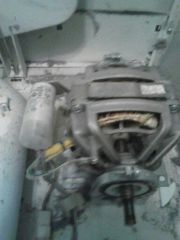FAQs | Repair Videos | Academy | Newsletter | Contact
Search the Community
Showing results for tags 'capacitor'.
-
New microwave capacitor and now HV transformer is humming
adam108 posted a topic in DIY Appliance Repair Help
My GE spacesaver (JVM1430BD) stopped working in the middle of microwaving and blew the inline fuse. After some digging and testing, it turns out the capacitor was bad (continuity between the two sides). I ordered a new one with nearly the same specs (2100wvac and 0.86uF on old vs 2100wvac and 0.91uF on new). When the part came it was about 0.5" shorter than the old one but otherwise fit into the holder etc. I installed it and turned the microwave back on...everything worked again. I microwaved some water and it heated it just as expected in the same amount of time as before the capacitor went out. An hour later I was in the kitchen and noticed a very soft hum. It was coming from the microwave and was very soft. The only reason I heard it was because the fridge had stopped its cycle and everything was dead silent in the kitchen. I took the cover off thinking it was the new capacitor or the diode. The sound actually seems to be coming from the HV transformer. While the microwave still had power to it, I went ahead and unplugged the diode from the capacitor for a few seconds wondering if maybe the old diode was bad and drawing current. Humming stayed the same with the diode attached or not. I re-tested the microwave function and everything still works as expected. Before I installed the new capacitor I had checked resistance for the HV transformer and it was appropriate. I also checked the magnetron for continuity etc. and everything seemed in order. I was convinced that the only thing that went bad was the capacitor. Any thoughts on why the HV transformer is humming. Again, it is very soft but I am convinced that it is louder than it was before the switch. Could the diode be bad despite the contiued hum when I disconnected it? Is the new capacitor not functioning properly? Is the shortened length or minor discrepancy in uF to blame? Most importantly, is a humming transformer dangerous/a risk? It just sounds like a piece of electrical machinery working but it is louder than before the fix. Thanks! -
Have any of you guys ever seen a bad capacitor when changing out the start device on a compressor? I just thought I'd ask because I m going out on whirlpool GI5SVAXVB01 tomorrow and Im almost certain its a bad start device. In the past I've ordered the capacitor with it just to safe, but I dont want to waste my customers money if not necessary. I've had techs tell me they've NEVER had to change out caps. I've tried to test them in the past, but they never really seemed to test like they're supposed to.What say you???AmeriTech
- 13 replies
-
kenmore coldspot 106.54683300 not cooling
Steve hates sears posted a topic in DIY Appliance Repair Help
I have a Kenmore Coldspot side by side fridge 106.54683300. It has stopped getting cold. I cleaned the condenser which was very dirty, having not been previously cleaned 12 years. The compressor was very warm to the touch. When I plugged it back in the compressor would go on for about 10-15 seconds then cut out. A few minutes later, it would repeat that cycle. I thought perhaps it was too hot, so I unplugged it and let it cool down. No luck. I pulled the relay start assembly, (2255198) and replaced it with the new generation one 2319792. Still, I am having the same issue, compressor comes on, then clicks off after about 10-15 seconds. Compressor is cool now (hasn't been run in a few hours), same issue. Could it be the capacitor? Any ideas? I don't like drinking my jack and coke with no ice. All of the fans are working. Thanks. -
Corroded/loose lead on compressor capacitor - Panasonic window AC
fred_perkins posted a topic in DIY Appliance Repair Help
We have a large Panasonic window unit (24000 btu, model #CWXC243HU) than is ten years old and has worked quite well over the years. Evaporator and condenser fins are cleaned annually, and e+ filter get replaced every two weeks while the unit is operational. Yesterday was a hot day (close to 90 F), yet the unit seemed to be running a bit colder than usual. Turned up the thermostat but it still seemed to be running cold. Then, around dinner time, as outside temps were cooling down, the unit stopped cooling and just churned out warm air. The fan ran all night, but the compressor wouldn't kick on -- even with the thermostat turned down to 60. Outside temps were in the 70s all night and already about 80 when we woke up -- rather uncomfortable for sleeping! Pulled the unit out of the window this morning and found that the wired connector has corroded (or arc-ed?) such that the wire is no longer connected with the common lead on the condenser capacitor. It's a dual cap with three leads, and the cap seems to be integrated within the compressor. The connector seems to be brass and has a hole burned through the middle. The pin on the capacitor is partly intact, but some of it is gone. I was able to clamp the wire (with clamping pliers) to the common pin on the capacitor and the unit runs and cools just fine. Obviously, the clamping pliers are not a long-term solution. But even if the brass connector on the wire were replaced, it wouldn't make very good contact since part of the capacitor's common pin has corroded (or arc-ed). Is it OK to just cut off the brass connector and solder the wire directly to the capacitor's common pin? Or would the solder just burn up over time as the compressor runs hot? -
From the album: appliance pics parts
capacitor LEW005PQ dryer, -
From the album: appliance pics parts
this is the drive belt motor and capacitor, thr blower motor also has a capacitor LEW005PQ dryer,





